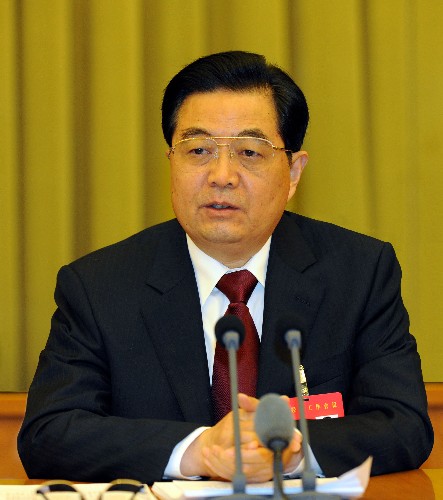China concluded the three-day annual Central Economic Work Conference Wednesday in Beijing with a pledge to maintain stable, healthy growth next year through domestic demand expansion and economic restructuring.
 |
|
President Hu Jintao addresses the annual Central Economic Work Conference in Beijing, December 10, 2008. [Xinhua] |
President Hu Jintao and Premier Wen Jiabao addressed the meeting, which is held once a year to set the tone for economic development during the next year.
It was agreed at the meeting, 2008 was an extraordinary year for China, in which the country experienced unexpected, seldom seen, major challenges. Those include severe winter weather at the beginning of the year, the May 12 earthquake and the current international financial crisis.
Fighting those challenges, China has taken a string of measures to further expand domestic demand and promote economic growth. As a result, the Chinese economy has kept growing relatively rapidly, with inflationary pressure eased and the economic structure improved.
The achievements "demonstrated the overall national strength China had built over the past three decades, proved the correctness of socialism with Chinese characteristics and justified the advantage of a socialist institution in pooling various forces to realize big feats," according to attendees of the meeting.
The achievements also displayed the "heroism and strong cohesion" of the Chinese nation.
As international financial woes worsened and permeated into the real economy worldwide, instabilities and uncertainties mounted for the Chinese economy. This, together with problems that already exist within the Chinese economy, downward economic pressure increased on the nation.
However, conference attendees noted, important opportunities for China's economic and social development still existed and would not be reversed by ongoing global financial woes.
As they pointed out, priority should be given to maintaining stable and relatively fast economic growth next year. This will be achieved through expanding domestic demand, restructuring the economy and transforming the growth pattern. All will ultimately target improving people's living standard.
In 2009, China will enhance and improve macroeconomic control efforts and carry out an active fiscal policy, as well as a moderately easy monetary policy, the central authorities decided.
In this regard, expenditures in public areas will be "substantially increased" and those in major areas should be guaranteed.
Financial support should be reinforced for farmers and agricultural production, employment, social welfare, education, health care, energy conservation and emissions reduction, technical innovation, manufacturing of state-of-the-art equipment, service and smaller enterprises. Subsidies and other aid should be increased for low-income earners.
It is also stressed more efforts should be made to "solve problems related to interests of ordinary people, so as to maintain stability of the society".
Wide-ranging measures should be taken to provide more jobs and improve social welfare systems for both urban and rural areas. Pension and health care insurance should cover more employees in urban areas, similar services should be offered on a trial basis in rural areas and related insurance should be established for rural migrant workers, according to the central authorities.
Also noted was the exchange rate of Chinese currency, Renminbi. Attendees said it should be kept "largely stable at a reasonable and balanced level".
Zhao Jinping, a researcher with the government think tank, the Development Research Center under the State Council, said it was necessary for China to mitigate the upward trend of Renminbi.
Tan Yaling, a Beijing-based financial expert, said Renminbi had not entered a channel of depreciation.
She was echoed by Zhao. He said depreciation would bring about outflow of short-term speculative funds, which was unfavorable for the stability of capital markets.
To achieve 2009's goals, the attendees pointed out, flexible and prudent macroeconomic policies should continue. China should also improve abilities to respond to changes and enhance the real effect of macro control efforts.
(Xinhua News Agency December 11, 2008)